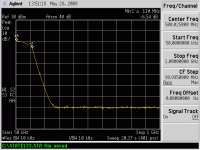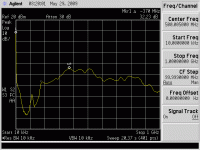john curl said:Getting back to 'factual' information. Scott, would you like to describe the transfer function of a multi-tanh input stage? As I recall, when I first noted it in IEEE 'Solid State circuits', that it looked pretty ragged, even if more grossly linear. THIS is supposed to supplant FETS? OR TUBES? Not in my lifetime.
However, Scott, why don't YOU start a tread on these NEW topologies?
As I think this was JC reply to my post ???
I comment some of this.
> Do you feel that people can actually utilize them in some way?
> That they can do this in their basement?
> Please, let's be practical here.
Not that I can see what this relates to my opinion posted. Huuuh!!
But I can symphatisize with the view expressed here.
If it is not good for diyaudio, then Scott keep it for yourself.
What everyday ordinary can use,
this is what has it's best place in this website.
Whatever else, let's leave it to the academical websites & über-tecnical doctorands papers, please, Mr. S. Wurcer.
I have expalined to you your previous shortcomings
to write so that any english or non-english average members here
can understand,
at least a couple of times before ... at least ..
Haven't I?
Or do I have to refer to old posts, though reluctant to have to repeat my opinions more than twice?
Are you that hard-to-get-the-message written for your own benefit? Dont really think so ...
Sincerely
Lineup - today in my home in dsar good old Sweden, the world that was long before USA
The Ney manual can be downloaded here:
http://www.deringerney.com/tech/techpapers/abstract6.asp?wp=6
Jan Didden
http://www.deringerney.com/tech/techpapers/abstract6.asp?wp=6
Jan Didden
john curl said:Andy_C, the article that you linked on 19022, is wonderful, thanks again.
You're quite welcome, John!
janneman said:The Ney manual can be downloaded here:
http://www.deringerney.com/tech/techpapers/abstract6.asp?wp=6
Jan Didden
Thanks for digging this link up. I'll be curious to see what has changed in the past 35 years.
My other comments were based solely on the concept of someone swapping out their fuses for the new $55. ones, hearing a difference and what that mechinism might be. I am open to the concept of hearing something being different in a finely tuned, familier system. I'm skeptical that the fuse itself would have any appreciable effect.
Mike
janneman said:We're anyway speculating here because there's no indication whether there actually is a difference or not, with what equipment, under which circumstances, etc.
Jan Didden
Not that my subjective opinion will count for much but here it is if you are interested.
A friend of mine import Furutech products and he asked my opinion on their fuses. My reply was that I can't imagine that it could make a difference because they are not directly in the audio path (OK I know everything is in the signal path in the end). He imported some anyhow and we tested them one afternoon in two sets of identical Class A monoblocks.
At first I replaced the fuses in the ac as well as dc lines, it took a few amp swops to detect a change but once detected the difference was quite obvious. Then I've tried with the fuses only in the ac and only in the dc lines, each time a difference was noted (although not as much as with all fuses replaced).
To give my opinion on your question, yes they do make a difference in SQ, whether they are worth the money, I guess that will depend on how much you value detail and accuracy in your system and of course the size of your wallet but that is besides the point isn't it.
André
When fuses (as any conductor) heat up their resistance dramatically change. Fuses working on the edge of their life/death point distort significantly. Sand was used more than century ago in fuses, to extinguish sparks.
But speaking of the language... It reminds me recent e-mail from a manufacturer of modern tubes (reminds my company name), they make little triodes out of CRT gun process. No doubt tubes have higher mechanical resonant frequencies, smaller capacitances, but the language was all about how one famous name calls the sound using visual predicates; how another one fell in love with the sound feeling kinestetic hallucinacions, and so on... When in response I've asked them one technical question very related to parameters that may be affected by sizes they did not answer.
It is hard today to deal with companies since they are surrounded by at least 2 barriers: call center somewhere in India, and a marketing department, may be still in USA...
So, the language will be something like this, "That Famous Guitar Player tried our fuse and found it is sweet like a kiss with banana smell in the Hawaiian night!"
But speaking of the language... It reminds me recent e-mail from a manufacturer of modern tubes (reminds my company name), they make little triodes out of CRT gun process. No doubt tubes have higher mechanical resonant frequencies, smaller capacitances, but the language was all about how one famous name calls the sound using visual predicates; how another one fell in love with the sound feeling kinestetic hallucinacions, and so on... When in response I've asked them one technical question very related to parameters that may be affected by sizes they did not answer.
It is hard today to deal with companies since they are surrounded by at least 2 barriers: call center somewhere in India, and a marketing department, may be still in USA...
So, the language will be something like this, "That Famous Guitar Player tried our fuse and found it is sweet like a kiss with banana smell in the Hawaiian night!"
Andre Visser said:
Not that my subjective opinion will count for much but here it is if you are interested.
A friend of mine import Furutech products and he asked my opinion on their fuses. My reply was that I can't imagine that it could make a difference because they are not directly in the audio path (OK I know everything is in the signal path in the end). He imported some anyhow and we tested them one afternoon in two sets of identical Class A monoblocks.
At first I replaced the fuses in the ac as well as dc lines, it took a few amp swops to detect a change but once detected the difference was quite obvious. Then I've tried with the fuses only in the ac and only in the dc lines, each time a difference was noted (although not as much as with all fuses replaced).
To give my opinion on your question, yes they do make a difference in SQ, whether they are worth the money, I guess that will depend on how much you value detail and accuracy in your system and of course the size of your wallet but that is besides the point isn't it.
André
André,
Thanks for your frank comment. I realize it is a valid experience for you. But to be honest too, and having studied perception and all that a bit, it is not a valid experience for me. You and a friend, spending money on an upgrade, then detecting the upgrade made a difference. Sorry, as experiences go, it's almost irrelevant for me. Except of course for you and that is what counts.
If I shell out for a new scope, for instance, I will tend to see that scope as a very or even exceptional one. Somebody else will buy another brand scope and for him THATs the best he could have got for his money. How could it be otherwise?
Jan Didden
whenever I've looked for a fancy part which comes in contact with mains voltage, like plugs or fuses, I looked for certifications or declarations of followed standards.Wavebourn said:When in response I've asked them one technical question very related to parameters that may be affected by sizes they did not answer.
Usually there were none...problem solved!
Regards
janneman said:You and a friend, spending money on an upgrade, then detecting the upgrade made a difference.
Jan Didden
That's the point, it wasn't meant to be an upgrade but an experiment to learn something for ourselves, perhaps if more of the anti-everything guys try and do the same..... Then again, there is no point in experimenting with such small things if the rest of the system is not up to the task.
FWIW, my amps still run on normal fuses.
john curl said:PMA, you too, have taken some cheap shots at me, recently, but why do you want to post this on this thread?
Because it is very important. Almost no one (including you) cares about RF (which is everywhere today), because almost no one has opportunities to evaluate this, and it is much easier to talk about wires, fuses etc. - that's the field where anyone, even amateur, can contribute. I am very sure, and it is MY belief, that secondary effects are discussed here, not primary reasons.
John and everybody, I sorry to interfere in the very interesting debate about fuses, but maybe the original fuses was in the wrong direction.
I was just curios about another matter:
Andre have you had time to do a new listening test
I was just curios about another matter:
Andre have you had time to do a new listening test
Andre Visser said:
I will try again with my speaker cables, it is just not a joke switching direction on bi-wire cables with spade terminals.
- Status
- Not open for further replies.
- Home
- Amplifiers
- Solid State
- John Curl's Blowtorch preamplifier

